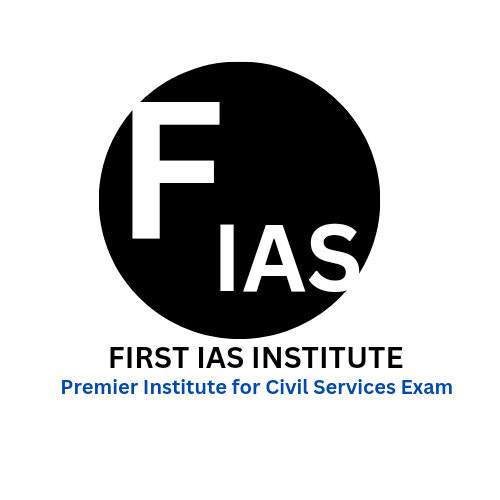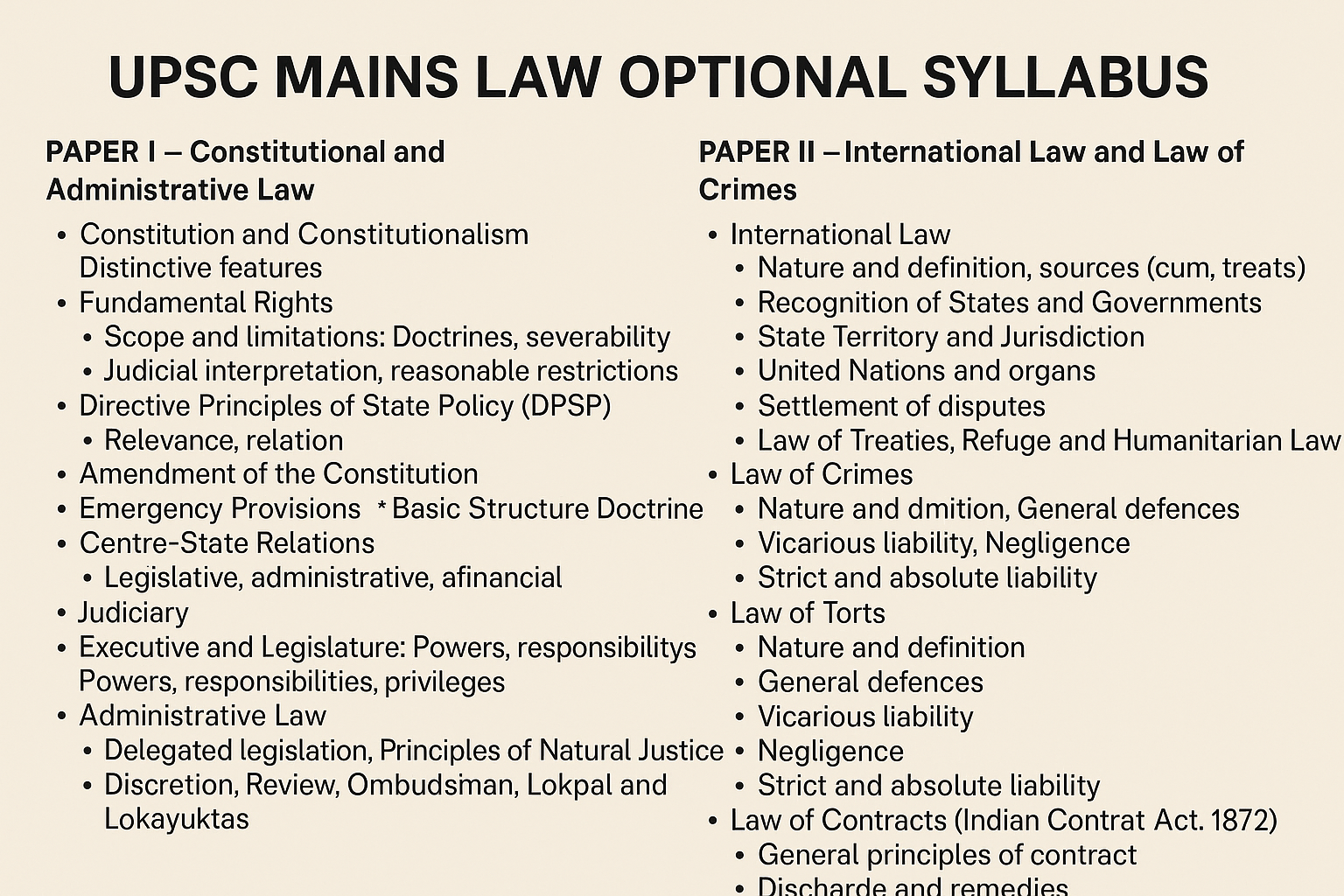UPSC Mains Law Optional Syllabus: A Comprehensive Guide for Paper I & Paper II
Choosing Law as an optional subject for the UPSC Civil Services Mains Exam is a strategic move, especially for candidates with a legal background or those who can grasp analytical concepts with ease. The syllabus, as prescribed by the Union Public Service Commission, is structured into two papers—Paper I and Paper II, each carrying 250 marks, making a total of 500 marks.
Let’s dive deep into each paper and explore the topics and sub-topics in detail.
Join WhatsApp community for Free Notifications, Updates, Study Material, Mock Tests, Internship Updates, and Current Affairs - CLICK HERE TO JOIN
PAPER I – Constitutional and Administrative Law
This paper primarily deals with the Constitution of India and the principles of administrative law. It requires conceptual clarity, analytical thinking, and the ability to relate provisions to current affairs.
1. Constitution and Constitutionalism: The distinctive features of the Constitution
- Meaning of Constitutionalism – theory of limited government.
- Features of the Indian Constitution – supremacy, federalism, separation of powers, rule of law, etc.
- Comparison with other constitutions to understand the uniqueness of the Indian model.
2. Fundamental Rights
- Scope and limitations of Article 14 to 32.
- Doctrine of Eclipse, Waiver, Severability, and Proportionality.
- Judicial interpretation and landmark judgments (e.g., Kesavananda Bharati, Maneka Gandhi, Puttaswamy).
- Reasonable restrictions and their evolving jurisprudence.
3. Directive Principles of State Policy (DPSP)
- Relationship between Fundamental Rights and DPSPs.
- Implementation and enforceability.
- Significance in social welfare legislation and state policy formation.
4. Fundamental Duties
- Relevance and judicial interpretation.
- Relationship with Fundamental Rights.
5. Amendment of the Constitution
- Procedure under Article 368.
- Basic Structure Doctrine (origin, evolution, and key cases).
- Judicial activism in constitutional amendments.
To Enroll in FIRST IAS INSTITUTE - Click Here
6. Emergency Provisions
- Types: National, State, and Financial.
- Constitutional checks and balances.
- Effect on Fundamental Rights and federal structure.
7. Centre-State Relations
- Legislative, administrative, and financial relations.
- Inter-State Council, Finance Commission, and GST Council.
- Contemporary issues: Cooperative vs. Competitive federalism.
8. Judiciary
- Structure and independence of judiciary.
- Judicial review and activism.
- Public Interest Litigation (PIL).
- Tribunals and quasi-judicial bodies.
9. Executive and Legislature
- Powers and responsibilities of the President, Governor, PM, CM.
- Parliamentary privileges and legislative procedures.
- Anti-defection law and role of the Speaker.
10. Administrative Law
- Evolution, scope, and significance.
- Delegated legislation: necessity and control mechanisms (judicial and legislative).
- Principles of Natural Justice – audi alteram partem, nemo judex in causa sua.
- Administrative Discretion and Judicial Review.
- Ombudsman, Lokpal and Lokayuktas.
Join WhatsApp community for Free Notifications, Updates, Study Material, Mock Tests, Internship Updates, and Current Affairs - CLICK HERE TO JOIN
PAPER II – International Law and Law of Crimes
Paper II covers aspects of International Law, Law of Crimes (IPC), and other legal frameworks such as Torts and Contracts. It tests analytical skills, case law knowledge, and applicability of legal concepts in real-world scenarios.
1. International Law
a. Nature and Definition of International Law
- Relationship between International Law and Municipal Law.
- Theories: Monism and Dualism.
b. Sources of International Law
- Customary International Law, Treaties, General Principles of Law, Judicial Decisions, Juristic Writings.
- Article 38(1) of the ICJ Statute.
c. Recognition of States and Governments
- De facto vs. de jure recognition.
- Consequences of recognition.
d. State Territory and Jurisdiction
- Modes of acquiring territory: occupation, prescription, cession, accretion.
- Territorial sea, contiguous zone, EEZ, and continental shelf under UNCLOS.
- Jurisdiction: territorial, personal, protective, and universal.
e. United Nations and its Organs
- Structure and powers of UN General Assembly, Security Council, ICJ, and Secretariat.
- Role of the UN in peacekeeping and conflict resolution.
f. Settlement of International Disputes
- Diplomatic and judicial methods.
- Role of arbitration and the International Court of Justice.
g. Law of Treaties
- Formation, reservation, interpretation, termination (Vienna Convention 1969).
h. International Human Rights
- Universal Declaration of Human Rights (UDHR), ICCPR, ICESCR.
- Refugee Law and International Humanitarian Law (Geneva Conventions).
To Enroll in FIRST IAS INSTITUTE - Click Here
2. Law of Crimes (Indian Penal Code, 1860)
a. General Principles of Criminal Liability
- Actus Reus and Mens Rea.
- Strict liability and vicarious liability in criminal law.
- Stages of crime: intention, preparation, attempt, commission.
b. General Exceptions
- Sections 76–106 of IPC: mistake of fact, necessity, private defence, insanity, intoxication, etc.
c. Joint and Constructive Liability
- Common intention (Sec 34) and common object (Sec 149).
- Unlawful assembly and riots.
d. Offences against the State and Public Tranquility
- Waging war, sedition (Sec 124A), and promoting enmity.
- Rioting, affray, and unlawful assembly.
e. Offences against Human Body
- Culpable homicide, murder (Sec 299–304).
- Hurt and grievous hurt, dowry deaths, and rash/negligent acts.
- Kidnapping, abduction, wrongful restraint and confinement.
f. Offences against Property
- Theft, robbery, extortion, criminal misappropriation, criminal breach of trust, cheating.
g. Offences relating to Marriage
- Bigamy, adultery (decriminalized), cruelty by husband or relatives.
h. Defamation
- Ingredients and exceptions (Sec 499–500).
3. Law of Torts
a. Nature and Definition
- Essential elements of tort: wrongful act, legal damage, legal remedy.
- Tort vs. crime vs. contract.
b. General Defences
- Volenti non fit injuria, necessity, private defence, statutory authority.
c. Vicarious Liability
- Liability of State, master-servant, principal-agent.
d. Negligence
- Duty of care, breach, causation, and damage.
- Professional negligence and contributory negligence.
e. Strict and Absolute Liability
- Evolution from Rylands v. Fletcher to MC Mehta case (Oleum gas leak).
4. Law of Contracts (Indian Contract Act, 1872)
a. General Principles of Contract
- Essentials: offer, acceptance, consideration, intention, capacity, free consent.
- Void, voidable, and illegal contracts.
b. Discharge and Remedies
- Performance, breach, frustration of contract.
- Remedies: damages, specific performance, injunction.
c. Specific Contracts
- Contracts of indemnity, guarantee, bailment, pledge, and agency.
Join WhatsApp community for Free Notifications, Updates, Study Material, Mock Tests, Internship Updates, and Current Affairs - CLICK HERE TO JOIN
Final Thoughts
The Law optional offers a well-defined and static syllabus, supported by abundant resources and case laws. The interlinkage between legal principles and current affairs makes it not just scoring but intellectually enriching too. For aspirants with a background in law or a keen interest in constitutional and legal matters, this subject can be a game changer.
Whether you're a law graduate or a generalist exploring options, a systematic approach to this syllabus—supported by landmark judgments, recent legal developments, and analytical writing practice—will go a long way in ensuring success.


 firstiasofficial@gmail.com
firstiasofficial@gmail.com
Leave a Comment